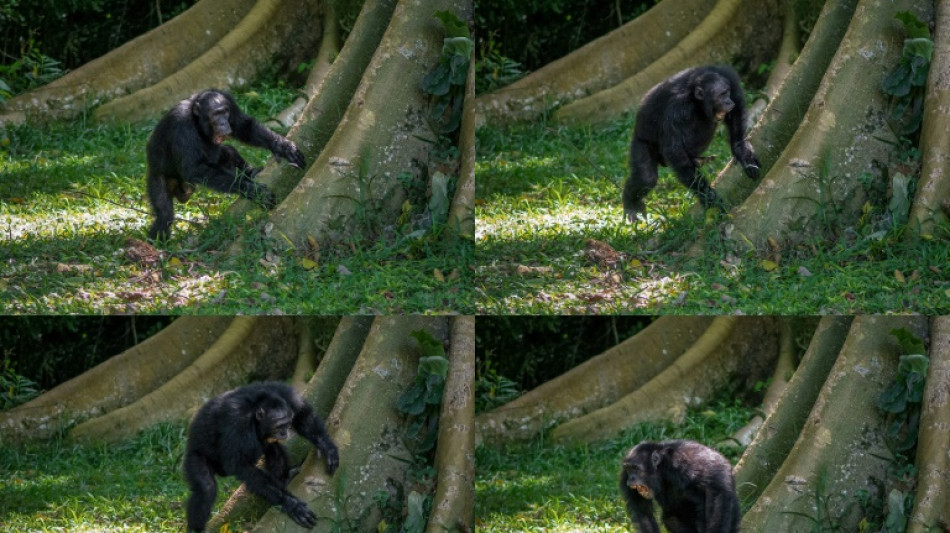
-
 Rockets veteran Adams out for rest of NBA season
Rockets veteran Adams out for rest of NBA season
-
Holders PSG happy to take 'long route' via Champions League play-offs

-
 French Senate adopts bill to return colonial-era art
French Senate adopts bill to return colonial-era art
-
Allrounder Molineux named Australian women's cricket captain

-
 Sabalenka faces Svitolina roadblock in Melbourne final quest
Sabalenka faces Svitolina roadblock in Melbourne final quest
-
Barcelona rout Copenhagen to reach Champions League last 16

-
 Liverpool, Man City and Barcelona ease into Champions League last 16
Liverpool, Man City and Barcelona ease into Champions League last 16
-
Tesla profits tumble on lower EV sales, AI spending surge

-
 Real Madrid face Champions League play-off after Benfica loss
Real Madrid face Champions League play-off after Benfica loss
-
LA mayor urges US to reassure visiting World Cup fans

-
 Madrid condemned to Champions League play-off after Benfica loss
Madrid condemned to Champions League play-off after Benfica loss
-
Meta shares jump on strong earnings report

-
 Haaland ends barren run as Man City reach Champions League last 16
Haaland ends barren run as Man City reach Champions League last 16
-
PSG and Newcastle drop into Champions League play-offs after stalemate

-
 Salah ends drought as Liverpool hit Qarabag for six to reach Champions League last 16
Salah ends drought as Liverpool hit Qarabag for six to reach Champions League last 16
-
Barca rout Copenhagen to reach Champions League last 16

-
 Arsenal complete Champions League clean sweep for top spot
Arsenal complete Champions League clean sweep for top spot
-
Kolo Muani and Solanke send Spurs into Champions League last 16

-
 Bayern inflict Kane-ful Champions League defeat on PSV
Bayern inflict Kane-ful Champions League defeat on PSV
-
Pedro double fires Chelsea into Champions League last 16, dumps out Napoli

-
 US stocks move sideways, shruggging off low-key Fed meeting
US stocks move sideways, shruggging off low-key Fed meeting
-
US capital Washington under fire after massive sewage leak

-
 Anti-immigration protesters force climbdown in Sundance documentary
Anti-immigration protesters force climbdown in Sundance documentary
-
US ambassador says no ICE patrols at Winter Olympics

-
 Norway's Kristoffersen wins Schladming slalom
Norway's Kristoffersen wins Schladming slalom
-
Springsteen releases fiery ode to Minneapolis shooting victims

-
 Brady latest to blast Belichick Hall of Fame snub
Brady latest to blast Belichick Hall of Fame snub
-
Trump battles Minneapolis shooting fallout as agents put on leave

-
 SpaceX eyes IPO timed to planet alignment and Musk birthday: report
SpaceX eyes IPO timed to planet alignment and Musk birthday: report
-
White House, Slovakia deny report on Trump's mental state

-
 Iran vows to resist any US attack, insists ready for nuclear deal
Iran vows to resist any US attack, insists ready for nuclear deal
-
Colombia leader offers talks to end trade war with Ecuador

-
 Former Masters champ Reed returning to PGA Tour from LIV
Former Masters champ Reed returning to PGA Tour from LIV
-
US Fed holds interest rates steady, defying Trump pressure

-
 Norway's McGrath tops first leg of Schladming slalom
Norway's McGrath tops first leg of Schladming slalom
-
Iraq PM candidate Maliki denounces Trump's 'blatant' interference

-
 Neil Young gifts music to Greenland residents for stress relief
Neil Young gifts music to Greenland residents for stress relief
-
Rubio upbeat on Venezuela cooperation but wields stick

-
 'No. 1 fan': Rapper Minaj backs Trump
'No. 1 fan': Rapper Minaj backs Trump
-
Fear in Sicilian town as vast landslide risks widening

-
 'Forced disappearance' probe opened against Colombian cycling star Herrera
'Forced disappearance' probe opened against Colombian cycling star Herrera
-
Seifert, Santner give New Zealand consolation T20 win over India

-
 King Charles III warns world 'going backwards' in climate fight
King Charles III warns world 'going backwards' in climate fight
-
Minneapolis activists track Trump's immigration enforcers

-
 Court orders Dutch to protect Caribbean island from climate change
Court orders Dutch to protect Caribbean island from climate change
-
Sterling agrees Chelsea exit after troubled spell

-
 Rules-based trade with US is 'over': Canada central bank head
Rules-based trade with US is 'over': Canada central bank head
-
Lucas Paqueta signs for Flamengo in record South American deal

-
 Holocaust survivor urges German MPs to tackle resurgent antisemitism
Holocaust survivor urges German MPs to tackle resurgent antisemitism
-
'Extraordinary' trove of ancient species found in China quarry


Jungle music: Chimp drumming reveals building blocks of human rhythm
Out west, they groove with fast, evenly spaced beats. In the east, it's more free-form and fluid.
Like humans, chimpanzees drum with distinct rhythms -- and two subspecies living on opposite sides of Africa have their own signature styles, according to a study published Friday in Current Biology.
The idea that ape drumming might hold clues to the origins of human musicality has long fascinated scientists, but collecting enough clean data amid the cacophony of the jungle had, until now, proven elusive.
"Finally we've been able to quantify that chimps drum rhythmically -- they don't just randomly drum," lead author Vesta Eleuteri of the University of Vienna told AFP.
The findings lend fresh weight to the theory that the raw ingredients of human music were present before our evolutionary split from chimpanzees six million years ago.
Previous work showed chimpanzees pound the huge flared buttress roots of rainforest trees to broadcast low‑frequency booms through dense foliage. Scientists believe these rhythmic signals help transmit information across both short and long distances.
For the new study, Eleuteri and colleagues -- including senior authors Catherine Hobaiter of the University of St. Andrews in the UK and Andrea Ravignani of Sapienza University in Rome -- compiled more than a century's worth of observational data.
After cutting through the noise, the team focused on 371 high-quality drumming bouts recorded from 11 chimpanzee communities across six populations living in both rainforest and savannah-woodland habitats across eastern and western Africa.
Their analysis showed that chimpanzees drum with definitive rhythmic intent -- the timing of their strikes is not random.
Distinct differences also emerged between subspecies: western chimpanzees tended to produce more evenly timed beats, while eastern chimpanzees more frequently alternated between shorter and longer intervals.
Western chimps also drummed more frequently, kept a quicker tempo, and began drumming earlier in their signature chimp calls, made up of rapid pants and hoots.
The researchers do not yet know what is driving the differences -- but they propose that it might signify differences in social dynamics.
The western chimps' faster, predictable pulse might promote or be evidence of greater social cohesion, the authors argue, noting that western groups are generally less aggressive toward outsiders.
By contrast, the eastern apes' variable rhythms could carry extra nuance -- handy for locating or signalling companions when their parties are more widely dispersed.
Next, Hobaiter says she would like to study the data further to understand whether there are intergenerational differences between rhythms within the same groups.
"Music is not only a difference between different musical styles, but a musical style like rock or jazz, is itself going to evolve over time," she said.
"We're actually going to have to find a way to tease apart group and intergenerational differences to get at that question of whether or not it is socially learned," she said.
"Do you have one guy that comes in with a new style and the next generation picks it up?"
O.Schlaepfer--VB



